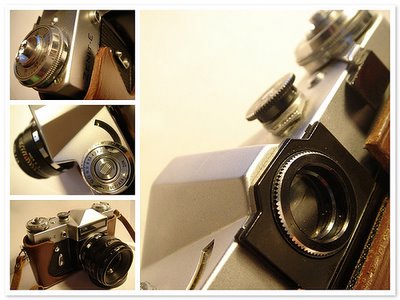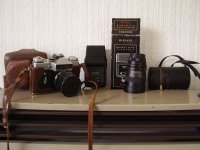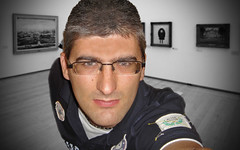Zenit E, Classics to use

Today I have become the proud owner of one of the Soviet made Zenit E cameras. Mine was made back in 1971 and ended up in a charity shop where most (sensible) people wouldn't give it a second glance.
Always up for a challenge, I popped a film in it today and went out to see if it still works mechanically and also to see if the lightmeter would still be sensitive to light after all these years.
Readers of my not-too-distant rangefinder post will know that I'm a great believer in using film based camera's and not so that I as a recent convert to photography, could claim to be a purist! No its for quite a different reason.
Today's cameras are quite sophisticated and the built in lightmeter will happily take care of all the settings leaving you free to just press the button. Sometimes you will be happy with the results but sometimes you may not. With a really old film camera, the art is quite different. Not only must you focus the image, but somehow you've got to decide how long the shutter needs to be open so that enough light hits the film to expose your picture correctly. Its these elements of photography that are lost all too easily in today's digital age and as I got to grips with this distinctively 'old' technology, I found it interesting to experience some more camera hardware from an age gone by.
With a really old film camera, the art is quite different. Not only must you focus the image, but somehow you've got to decide how long the shutter needs to be open so that enough light hits the film to expose your picture correctly. Its these elements of photography that are lost all too easily in today's digital age and as I got to grips with this distinctively 'old' technology, I found it interesting to experience some more camera hardware from an age gone by.
Once you have focused your image and decided on a shutter speed, its nearly time to press the button, but not before fiddling with one more blast from the past. This time, its not the camera that looks old fashioned but the lens. On modern camera's the lenses iris will stay fully open until you take the picture. This makes the image in the viewfinder nice and bright. Only when you press the shutter release button does the iris move in to the setting you (or your camera) has chosen, but theres nothing like this here.
No the last job is to manually move the iris to the correct setting that you choose and then give the button a good ol press and... pray!
Anyone who's interested in photography and anyone who fancies getting back to doing it all the old way (using your brain instead of the camera's) will be interested to hear that you can pick up a well kept Zenit E from ebay for £20+, at that price, why not give it a go. There's definitely something satisfying about getting a successful print back.
Ps. Bravo! to Billy Barlow from Biddulph for Bringing me the camera :-) Brilliant!








4 comments:
Great article.
I've been intrested in film photography for a while now.
I have no idea where to begin,
Aside from experience with Digital Cameras (evidently extremely different from film).
I've had my eye on the Zenit E for a long time.
I'd like to know what films it accepts, and other distinct information as to how to use the camera.
I'd be greatly appreciated.
im starting to take a photography class in my highschool
and have always been interested in photography
i recently received my grandpas old zenit E camera
its the xxv ciezt verzion
I am also relatively new to photography, and I have the same love for the completely manual process. I have a Zenit E, and it is extremely pleasant and satisfying to use. the results are great if you get things right. And you can do things that are theoretically "wrong" but look cool sometimes (like overexposing) which is more cumbersome and less "free" with a digital. Even more primitive, I recently got a FED rangefinder from 1940. Both the original glass (industar 22) and a Carl Zeiss Jena Sonnar make fantastic pictures. Both the Zenit pics and the FED pics actually look better than those from a Nikon FA, a very advanced SLR from the 1980s for which I have some theoretically advanced leneses. In other words, old Russian glass and bodies are fantastic. thanks for posting this stuff.
BTW- JOSE, the Zenit accepts standard 35mm film and does well with all kinds, although some do better than others.
This plain viewfinder is very interesting to concentrate on composition! No microprism, no Fresnel lens, no split image... no exposure meter inside... so you can learn a lot... concentrating on the subject only!
Post a Comment